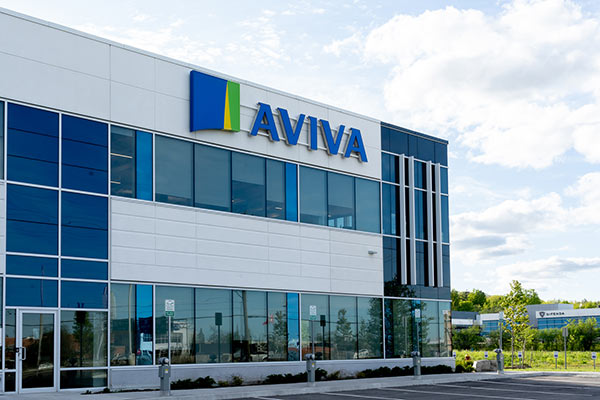Aviva shares tipped to generate big income and capital returns
Shares are at their highest in over 11 months and up 18% since August, but the insurer is still one of the highest-yielding stocks around. And this analyst thinks the outlook is the brightest in almost a decade.
21st February 2024 13:19
by Graeme Evans from interactive investor

High-yielding Aviva (LSE:AV.) shares have been flagged for a potential re-rating as the UK’s life insurance sector moves back into favour after nearly a decade in the doldrums.
Bank of America’s upgrade to a “Buy” recommendation comes with Aviva’s forecast yield the third highest in its coverage of more than 25 European insurers.
Based on its estimates for 2024, the shares yield dividend income of 8.4% and an all-in figure of 11% when including £300 million of annual share buybacks.
- Invest with ii: SIPP Account | Stocks & Shares ISA | See all Investment Accounts
Even at the bank’s new price target of 490p, Aviva shares offer a 7.7% dividend yield compared to the sector-average 5.3%. The shares were today at 446p, broadly where they stood a year ago.
The bank’s note to clients praised the operational performance of a “more focused, disciplined” Aviva under the leadership of chief executive Amanda Blanc.
Since taking the helm in 2020, she has streamlined the business behind life and general insurance operations in the UK and property and casualty lines in Canada.
Annual results on 7 March are due to show operating profit growth within the company's 5-7% guidance range, despite challenges caused by inflation and weather-related claims.
Aviva has already flagged a dividend cost of about £915 million in 2023, the equivalent to about 33.4p a share when including a forecast final dividend of 22.3p. It then intends to grow the pay-out distribution in the region of low-to mid-single digits.
However, the lower number of shares in circulation due to annual buybacks means Bank of America sees Aviva delivering 7.3% annual dividend growth at a cost rising 4.5% a year.
- Sign up to our free newsletter for investment ideas, latest news and award-winning analysis
- HSBC shares dive after messy final quarter causes profit miss
- DIY Investor Diary: this rule takes the emotion out of investment decisions
Despite the progress made in recent years, the shares trade on 9.2 times 2025 earnings. At the bank’s new target price, a multiple of 10.5 times compares with the sector’s 9.7 times.
The bank said: “We think payment of the final dividend and start of the buyback (both due over the coming three months) should act as catalysts for the stock and can support re-rating.”
It added that Aviva's operational story is now a non-controversial one, and that the company should be able to deliver steady earnings growth in the UK and Canada.
The bank added: “The UK will benefit from a golden-age for the bulk annuity market, steady growth in UK protection, steady growth in UK workplace and retail savings, and strong franchises in UK and Canadian personal and casualty lines.”
In addition, sentiment in the UK life insurance sector appears to be brightening after nearly a decade blighted by low interest rates and Brexit headlines.
The uncertain economic backdrop and an inverted yield curve, where long-term interest rates are below short-term rates, have kept UK life stocks out of fashion. The transition to IFRS17 accounting standard has also been unhelpful.
The bank added: “With our strategists pointing towards a yield curve normalisation over the coming year, we think this suggests an attractive entry point for Aviva.”
- Dividends worry mining sector income investors
- Stockwatch: what price might bidders pay for Currys shares?
- Rio Tinto and Glencore confirm dividend income
A week ago, UBS upgraded its price target to 515p and said there looked to be an upside risk to the insurer’s cash generation target for the period of 2024-26.
interactive investor has just teamed up with experts at eyeQ who use artificial intelligence, macro factors and their own smart machine to generate actionable trading signals. Here’s what they say about Aviva:
“Aviva is trading off big-picture conditions as well as company news. Macro relevance is currently 80% on eyeQ’s strategic long-term model (above 65% means the macro environment is critical, so any valuation signals carry strong weight).
“The latest share price rally has taken the insurer 3.9% above where macro conditions say it ‘should’ trade. That’s not quite a big enough Fair Value Gap (difference between our model value (fair value) and where the price currently is) to trigger a signal on eyeQ’s AI framework. We need to see more like a 5% premium for that.
“But it is worth contrasting with Legal & General Group (LSE:LGEN), which is also a macro play (84% relevance) and which screens as 2% cheap to the big-picture environment. There may be solid company fundamental reasons for the discrepancy, but it is worth noting the divergence between the two from a purely macro perspective.”
These articles are provided for information purposes only. Occasionally, an opinion about whether to buy or sell a specific investment may be provided by third parties. The content is not intended to be a personal recommendation to buy or sell any financial instrument or product, or to adopt any investment strategy as it is not provided based on an assessment of your investing knowledge and experience, your financial situation or your investment objectives. The value of your investments, and the income derived from them, may go down as well as up. You may not get back all the money that you invest. The investments referred to in this article may not be suitable for all investors, and if in doubt, an investor should seek advice from a qualified investment adviser.
Full performance can be found on the company or index summary page on the interactive investor website. Simply click on the company's or index name highlighted in the article.